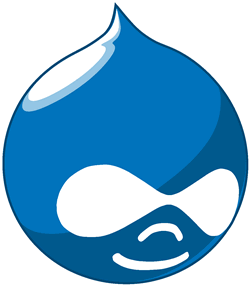Advantages of Drupal: Why you should use Drupal

I develop all my websites, web applications, and digital systems with Drupal – for good reason: Among freely available website frameworks, Drupal is the most powerful. Whether you need a sleek company website, a complex e-commerce platform, or a system with sophisticated business logic – everything is possible with Drupal.
If you found my website and this page, you are probably looking for an experienced Drupal expert or specialist, a Drupal developer or freelancer. Maybe you are already working with Drupal or Drupal CMS 1.0, or are considering using it for your project? In either case, you’re in the right place: I have been working with Drupal since 2008 and bring deep technical expertise as well as practical experience from a variety of successful projects.
But also if you are new to Drupal, it’s worth taking a closer look:
Drupal is the ideal solution if you want a stable, secure, and highly customizable system
– especially for long-term, growth-oriented projects.
Benefits of Drupal – Why Drupal is the Ideal Solution for Your Website
Allow me to show you what is possible with Drupal and why it is particularly worthwhile when standard solutions reach their limits – also from the perspective of a Drupal expert. Whether you are already working with Drupal or just starting out: I support you in unlocking the full potential of this platform – trustworthy, meticulously, and future-proof.
- Extremely flexible and scalable:
Drupal is one of the leading web frameworks worldwide. It is suitable for anything from simple websites and blogs to complex web applications, e-commerce systems, or social networks. Thanks to its modular structure, many features can be added using so-called "modules." Where these modules fall short or more specific logic is needed, I step in with custom programming to deliver tailored solutions. - Comparison with other systems:
Compared to other CMS platforms like WordPress, Joomla, or Typo3, Drupal offers the broadest range of features and excels when it comes to flexibility, scalability, and handling complex requirements. Among professionals, there’s a broad consensus that Drupal is the CMS with the most capabilities and reach (find out more). - A new, user-friendly version
With the launch of Drupal CMS 1.0 (Starshot) in January 2025, this flexibility expands to include a user-friendly option for users seeking a simple solution without in-depth programming knowledge. Drupal CMS enables websites to be created and customized quickly – ideal for businesses and individuals who want a powerful CMS but don't require complex development. This user-friendliness is continually being expanded, and -if you choose to - may also include cutting-edge AI innovations. - Large community & rich ecosystem:
Drupal has a global, active open-source community that provides thousands of free modules and themes. These allow for rapid implementation of many desired features. When off-the-shelf modules aren't enough, I develop custom extensions or adapt existing ones to precisely match your needs. - Open-source and cost-efficient:
Drupal and most of its modules are available for free — unlike many other platforms where key features often come at a cost. This reduces licensing expenses and ensures long-term independence. When custom functionality is needed, I efficiently extend Drupal’s capabilities through targeted programming tailored to your business. - User-friendly content management:
Drupal empowers you to manage your site content without needing to write code. You can add text, images, and media via intuitive forms and build pages and menus easily. I configure the underlying structure and logic so that you can work confidently and independently. For more complex data or workflows, I develop custom forms and automated logic in the background. - Modular with room for custom logic:
Whether it’s blogs, forums, user management, login areas, e-commerce, or API integrations — Drupal can be customized to meet your requirements. However, in many real-world cases, standard solutions are not enough. I implement custom modules and business logic where needed, whether it's unique workflows, third-party system integrations, or complex data processing. - API-first & headless-ready:
Drupal can act as a backend-only data server (headless CMS), serving content through modern APIs such as REST, JSON:API, or GraphQL to frontends built with frameworks like React, Vue, or Angular. I handle the full implementation — from standard APIs to custom formats and logic. - State-of-the-art technology:
Starting with Drupal 8, the system was completely rebuilt based on modern standards such as the Symfony framework and object-oriented PHP — making it a powerful, secure, and future-proof platform. The ability to go deep into the code when needed makes Drupal especially valuable for organizations with specific technical needs. - Enterprise-level security:
Drupal has a dedicated security team that regularly audits the core system and its modules. This gives Drupal one of the strongest security track records among CMS platforms — a major reason it's used by governments, universities, and global enterprises. - My experience as a Drupal expert:
Over the past 15+ years as a Drupal Developer (30+ years experience as a software engineer), I have delivered a wide range of projects — from small blogs to large platforms with complex logic and business requirements. I leverage the full power of Drupal: using existing modules where they fit, and developing custom solutions when they don't. The result: a system that meets your exact needs, without compromise.
Drupal vs. WordPress (and a Look at Joomla & TYPO3)
If you are interested in how Drupal compares to Wordpress, you can read more here.
Why you need my help with Drupal
Drupal is pretty awesome, because you can "wire together" a lot using thousands of modules. And that's a major advantage to you: you can build quite a bit of cool stuff just by configuring the system.
At explained, Drupal has the most range of all the CMS system (you can do the most with it), but it is also the most complex. And at one point, sooner or later, you will hit the limits of what can be done through simply configuring Drupal, and you have to get into the code. Or you have specific business logic which needs to be encoded correctly in the software. Or... you want a Drupal Expert do it for you.
I use Drupal elusively since 2008 and am an expert with 30+ years as a software engineer who knows how to skillfully leverage the strengths of Drupal and avoid its weaknesses: I use Drupal for what it is good at using "The Drupal Way." For the rest, I write code, and do it right!
Please contact me to find out more about how I can help you with your Drupal project.
My Qualifications
- I studied Computer Science at some of the top Universities in the USA:
- Ph.D. Candidate in Computer Science, University of Pennsylvania www.upenn.edu (one of the Ivy League Universities, like Harvard and Yale)
- Master of Science in Computer & Information Science, University of Florida www.ufl.edu(TOP 10 public university, ranked #1 in 2023 by the Wall Street Journal)
- Bachelor of Science in Computer Science, University of Utah www.utah.edu
- 17+ years experience with Drupal (since 2008): Drupal expert, Drupal architect, Drupal developer, Drupal freelancer
- 30+ years experience in Software Engineering, many with very large and world renowned companies in the USA, such as:
- the Walt Disney Animation Studio disneyanimation.com (several movie-credits on major motion pictures, including Oscar winners and nominees)
- Marriott Vacation Club.
- Waste Management (WM, US Fortune 200 Corporation)
- Bilingual in German and English (some French and Spanish)







